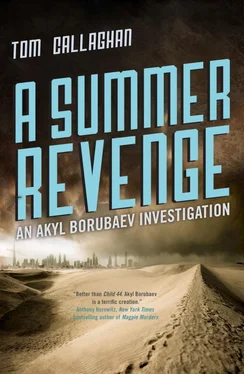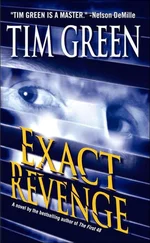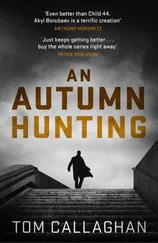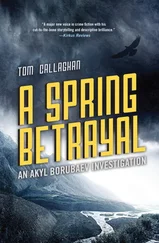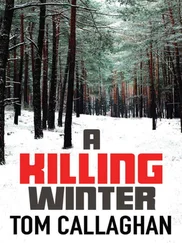I listened, my ear pressed to one side of Saltanat’s phone as the call was answered. I nodded; it was Boris’s voice all right.
“Good day, sir,” Saltanat said, her voice the bouncy insinuating tones of the born telemarketer. “I’m calling on behalf of the Bishkek Pizza Company, the home of Asia’s finest pizzas, conquering the world even faster than Ghengis Khan. And you’ve been selected at random to join our Privilege Pizza Club, offering a lifetime’s free membership, a twenty percent discount on our regular menu and a host of special offers including free delivery.”
I was impressed; Saltanat was surprisingly good at this. If she ever decided to stop killing people, she had a bright future in thin-crust toppings.
We knew that Boris had my mobile number, but not hers. Tempt him with enough free offers, together with a seductive female voice, and the odds were that he’d give away his location.
“Our delivery vans are in the Bur Dubai area now,” Saltanat continued, dropping her voice to a husky, breathless tone that reeked of sex, “and we’d love to deliver one of our special pizzas to you, as a free incentive to join.”
She paused; the trick is knowing when to leave the bait floating and when to jerk the line.
The silence told me that Boris was thinking it over; offers that sound too good to be true are usually just that. But greed usually overcomes any misgivings, and I already knew that Boris was happy not to pay for something when he didn’t have to. Lin’s face was testimony to that.
“OK,” he finally grunted.
“We just need your name, apartment number and building address,” Saltanat prompted. “We can have the pizza with you in thirty minutes.”
Boris gave out the details, then hung up. No word of thanks, not that I’d expected any. Chechens make even the Kyrgyz look demonstrative.
Saltanat switched off her phone, turned to me. “Now what?”
“The first thing we do,” I said, “is order a thin-crust pizza diavolo, all the toppings, extra onions and peppers, plus Coke.”
Lin and Saltanat stared at me.
“You’re hungry?” Lin asked.
“Yes, starving,” I said. “But if Boris doesn’t get the pizza he’s expecting, don’t you think he’ll get rather suspicious?”
I decided against checking out the location straight away. If we were to do anything, we needed the element of surprise, and Boris would smell a rat if he saw us loitering outside his building. Add the police CCTV cameras everywhere, plus the building’s own security, and it was obviously better to appear only once, when we arrived to hit the place.
We dropped Lin off back at the Vista; as she said, there’s someone for everyone, even with a face like mine. And I supposed two hundred dirhams was a better result than no dirhams at all.
Back at the Dôme, where our ever-present waitress brought coffees without us even needing to order, it was time to decide what to do next.
“You don’t even know if Natasha’s there,” Saltanat objected when I proposed that we raided Boris’s apartment.
“I don’t even know if she’s alive,” I answered. “But if she is, and I manage to get her out in one piece, I’ve done what Tynaliev asked me to do. Which saves my skin, at least for another day. And even if she’s not, you still get a chance to wipe out your jihadi hit squad. With any luck, we both get lucky.”
I could see that Saltanat wasn’t convinced, but in the absence of a better suggestion had decided to stay silent. I looked around the room; everything seemed so normal, affluent, free from poverty, corruption, desperation. No working girls in one corner, no lonely sex-starved men in another. The noise was subdued, polite chatter about children, schools, the new car or the next vacation. It was a world I knew existed, even in Bishkek, but not one I’d ever been part of. If you’re Murder Squad, then you’re excluded from polite circles as efficiently as if you were a leper. And in some ways, dealing with the fallout and being scarred by it, that’s what you become.
“We don’t know how big Boris’s team is,” Saltanat said. “We don’t have the people, the firepower to do this.”
I shrugged, raised my hands in a what-to-do gesture. “I’m dead if I go back to Tynaliev without Natasha, or at the very least, his money,” I said. “He’s not going to let me live to sell what I know to the highest bidder. So I don’t really have a lot of choice, do I?”
I took a tiny sip of my espresso. Refined, genteel, just like everyone around me, with only one exception, the one sitting opposite me.
“How many rounds do you have for your Makarov?” Saltanat asked in the tone of a hostess asking if you’d like another slice of chocolate cake with your coffee.
“A few. Back at my hotel. Right now, here and now? I’m not even firing blanks.”
“Which suggests what?”
“That we need to get hold of some proper artillery?”
“Which you don’t know how to find, with your only contact here having been burned to a crisp,” Saltanat said.
“Which leaves me with what?” I asked. “A kamikaze mission?”
“As plans go, one that leaves a little to be desired,” Saltanat said, finished her espresso and waving for another. I could tell by the way that her fingers flexed that she wanted a cigarette. Either that or to throttle me.
“You’d prefer a plan where I survive?” I asked, wondering if this was Saltanat’s idea of a declaration of love, or at least intent.
“You sometimes have your uses,” Saltanat said and allowed the merest hint of a wink to slip across her face.
The knowledge that you may be approaching your death, voluntarily, long before you’re supposed to wait in your bed for death to slip in under the sheets beside you and embrace you, has a curiously erotic effect. Life has a habit of persisting, demanding that you pay attention and hoping that the future is still infinite. Which is how I found myself in my hotel bed, but with Saltanat lying beside me, as far removed from death as it’s possible to get.
We’d made love before, so we didn’t have that sense of tentative surprise, wondering what the other liked or didn’t like. But we were still new enough to each other’s bodies to discover fresh choices, a sense of maps not yet charted, of routes not yet explored. And afterward, as the afternoon light started to diminish and collapse into dusk, I felt alive, more so than since Chinara’s death. The lights of the city started to appear, casting a glow that spilled across the sky. In my air-conditioned room it was easy to forget the brutal heat outside, the wet air that snatched at the lungs. The buildings opposite hung in the air like motionless flags, and I felt as if all the clocks in the world had silently come to a halt.
I must have dozed off, because when I looked around I was alone in the bed. Saltanat sat by the window, naked, staring out at the city, a half-drunk bottle of beer by her elbow.
“I made a couple of calls,” she said. “Ordered some hardware for later.” She stared across the room at me, as if puzzled by my presence. “Akyl, why is it you always rush into situations unprepared?” she asked, then answered her own question: “You need the adrenalin that badly, or you just can’t stand the thought of staying alive long enough to become an Aksakal ?”
I’ve never relished the prospect of being a white beard, a village elder, but dying young has strictly limited charms for me as well. But I realized it was a serious question, and Saltanat deserved a serious answer.
“I learned a few things during my time in Murder Squad,” I began, sure that my explanation would sound lame. “One of them is that most murders are unplanned. A blow in a drunken argument over nothing, resentment toward a husband or wife that finally spills over into seizing a knife from the kitchen drawer. Of course there are also the psychopaths, the Morton Graves of this world, who kill for pleasure and plan every detail so they can relive it over and over, but even they make mistakes, fail to anticipate what will cause their downfall.”
Читать дальше
